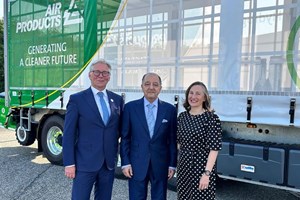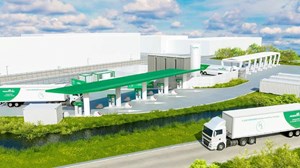News
Air Products trials first Mercedes-Benz GenH2 trucks as part of pioneering project with Daimler Truck
Air Products unveiled plans to build a network of permanent, commercial-scale H2 refueling stations (HRSs), strategically located along major transportation corridors near the Trans-European Transport Network (TEN-T). This vital infrastructure will help connect key locations across Europe and support the advancement of a safe and resilient H2 ecosystem.
Air Products’ commercial-scale stations will deliver enhanced fueling technology, multiple pressure fueling options and ultimately, onsite liquid H2 storage, which enables liquid fueling. As part of a robust European H2 network, they will help ensure reliability and convenience for heavy-duty transportation powered by H2.
Air Products’ HRSs will be supplied with renewable H2 from its global H2 supply chain network, providing a dependable energy supply to heavy-duty transportation. This includes a second H2 liquefaction plant the company is building in Rotterdam, which, once operational, will double Europe’s total liquid H2 capacity.
Progressing from plans to action. Air Products is already making progress. A number of current and planned stations have already been awarded subsidies by the European Commission through their Connecting Europe Facility (CEF) funding program. These include:
- HRS’s in Rotterdam, the Netherlands and Hürth Germany currently in commissioning phase
- An HRS located at the Volvo Group site in the port of Ghent, Belgium
- Europe’s first commercial-scale HRS with liquid H2 in the port of Zeebrugge, Belgium.
In addition to CEF-funding, the company has also been awarded funding from the Ministry of Economic Affairs, Industry, Climate Action and Energy of the State of North Rhine-Westphalia, to build two high-capacity, publicly accessible HRSs in Meckenheim and Duisburg, Germany.
In collaboration with Daimler Truck, a leader in heavy-duty transportation and decarbonization, Air Products’ latest mobile fueling station in Duisburg is being used in their pioneering H2 truck pilot project. As part of customer-trials, five Mercedes-Benz GenH2 trucks can refuel at the station enabling it to operate under real, heavy-duty fueling conditions. This will offer vital insights into the liquid H2 fueling interface and help inform the ongoing development of a future-ready H2 ecosystem.
Aligned with Air Products’ commitment to convert its distribution fleet to H2-powered vehicles, it is also trialing one of the GenH2 trucks as part of the project. The vehicle will be deployed in Air Products’ existing fleet to transport cylinder gases, allowing it to gain valuable experience in the field of industrial gas transportation.
The Mercedes-Benz GenH2 trucks will be fueled with liquid H2, which enables a range of over 1,000 kilometers. In this aggregate state the energy carrier has a significantly higher energy density and as a result, more H2 can be carried, which significantly increases the range and enables comparable performance of the vehicle with that of a conventional diesel truck. Transportation can be significantly reduced with liquid H2, and liquid H2 tanks also offer advantages in terms of cost and weight compared to compressed gaseous H2. Thus, the use of liquid H2 enables a higher payload. This makes the Mercedes-Benz GenH2 Truck just as suitable for flexible and demanding long-haul road transportation as conventional diesel trucks.
Seifi Ghasemi, Chairman, President and Chief Executive Officer of Air Products said, “With thousands of trucks delivering industrial gases to our customers every day, logistics is an integral part of our business. Trialing a Mercedes-Benz GenH2 Truck under real conditions is a critical step in our work to convert our distribution fleet to H2-powered vehicles. On the pathway to sustainable transportation, safe and reliable production, transportation and distribution of renewable H2 across the entire value chain is also essential. This is Air Products’ proven area of expertise, and we’re proud to be providing critical refueling infrastructure and liquid H2 as part of this project.”
Martin Daum, Chairman of the Board of Management of Daimler Truck AG said, “It is important to note that high-performance CO2-neutral vehicles alone will not be enough to make sustainable transportation successful. This also requires a corresponding charging and refueling infrastructure, as well as cost parity with conventional vehicles. Although policymakers and energy companies are already active here, we urgently need even more momentum, across the entire Europe.”



